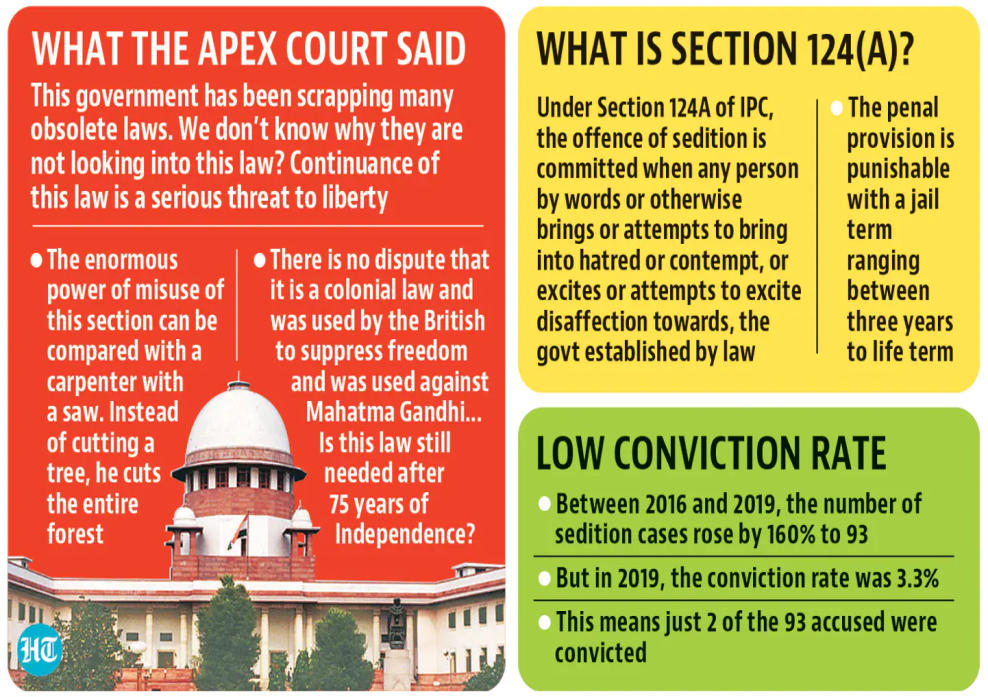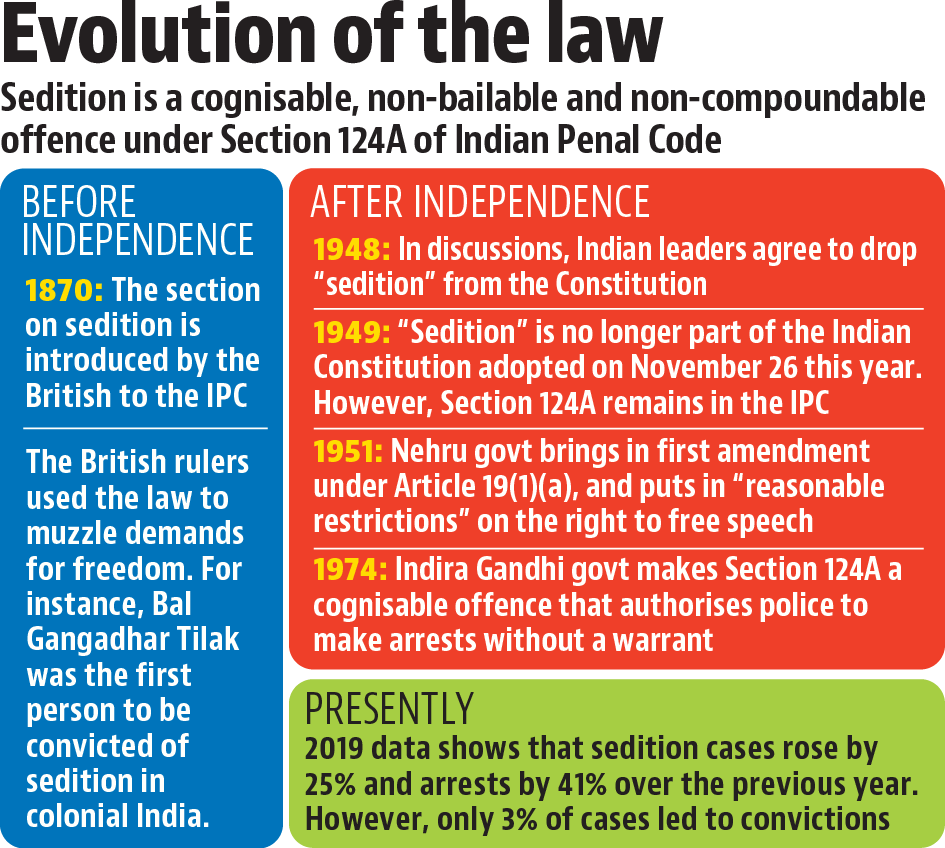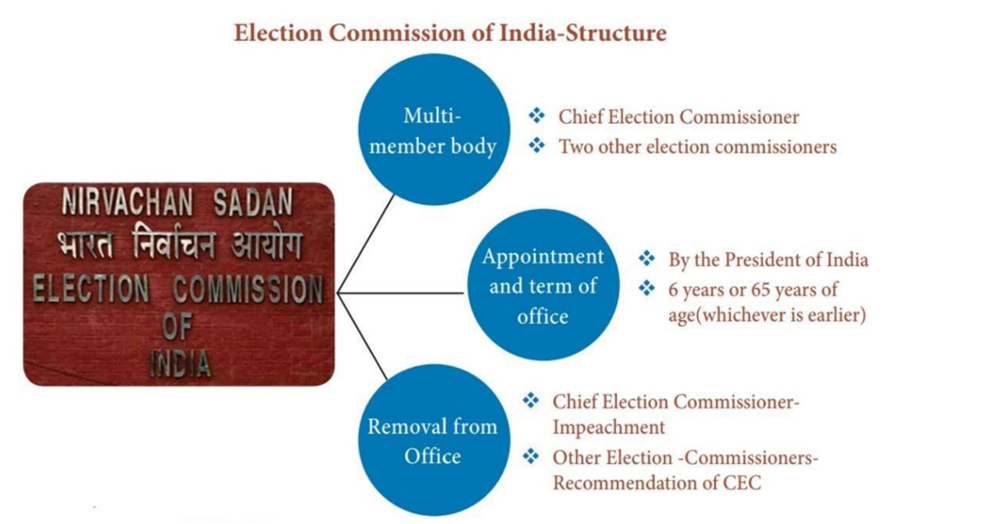ALL INDIA RADIO
THE SUPREME COURT HAS SUSPENDED ALL THE PENDING CRIMINAL TRIALS UNDER SECTION 124A OF IPC.
Significance of the topic
- The Supreme Court suspended all the pending criminal trials and court proceedings under Section 124A (sedition) of the Indian Penal Code and allowed the Union government to reconsider the sedition law.
- The court has made it clear that the Center and States should restrain from registering FIRs, continuing investigations or taking coercive measures under Section 124A while the “reconsideration” of the colonial provision was on.
- The Ministry of Home Affairs highlighted that the Government always expressed unequivocal views in favour of the protection of civil liberties, respect of human rights, and giving meaning to the constitutionally cherished freedoms by the people of the country.
- In the 1962, Kedar Nath Singh case, the Supreme Court upheld the validity of the sedition law while attempting to restrict its scope for misuse.
- It had held that unless accompanied by incitement or a call for violence, criticism of the government cannot be construed as a seditious offence.

Copyright infringement not intended
Sedition law
- It was Drafted by Thomas Babington Macaulay in 1837.
- According to the Macaulay draft, Sedition was defined as an act by ‘whoever, by words, either spoken or written, or by signs, or by visible representation, or otherwise, brings or attempts to bring into hatred or contempt, or excites or attempts to excite disaffection towards the Government in India’.
- The Sedition charge was included under Section 124 A of the Indian penal code in 1870.
- It was imposed by the British Colonial government to mainly suppress the writings and speeches of Indian freedom fighters.
- The Writings of Mahatma Gandhi, Lokmanya Tilak, Jogendra Chandra Bose etc, were suppressed and they were punished under sedition law for their statements on British rule.
- As per Section 124A of IPC, sedition is a non-bailable offence.
- It is punishable with imprisonment from 3 years up to a life sentence, along with a fine or both.
- A person charged under sedition law is also banned from a government job and their passport is seized by the government.
- The sedition charge was abolished by the United Kingdom government in 2010.

Copyright infringement not intended
Concern
- According to the Kedar Nath judgment in 1962, the sedition law was supposed to be applied in rare cases where the security and sovereignty of the country are threatened.
- However, there are growing examples to show that this law has been used as a tool against political rivals, to suppress disagreement and free speech.
- As per the latest data, more than 25 sedition cases were filed after the anti-Citizenship Amendment Act protests, nearly 22 after the Hathras gang rape, and 27 after the Pulwama incident.
- In all, 96% of the sedition cases filed against 405 Indians over the last decade were registered after 2014.
- The conversion rate in these cases is only 3%.
- The low conviction rate shows that the police and state authorities are using the sedition laws to create fear amongst the citizens and to silence any criticisms or disagreement against the people in power.
- The main problem with the sedition law is that it is poorly defined. The terms “bring into hatred or contempt” or “attempt to excite disaffection” can be interpreted in many ways and this empowers the police and government to harass innocent citizens.
- Due to its poor definition, sedition law can be used by the police to falsely accuse individuals as it does not state which acts are seditious and provides a broad outline of what can be classified as seditious.
Way Forward
- The Constituent Assembly of India opposed the inclusion of sedition as a restriction on freedom of speech and expression.
- The constitution makers had highlighted the sedition provision as a shadow of the colonial mindset that should not exist in free India.
- But still, it is continuing under section 124A of the IPC.
- The Law Commission report highlighted that;
- In a democracy, singing from the same songbook is not a benchmark of patriotism.
- People should be allowed to show their affection towards their country in their way.
- A democracy needs constructive criticism or debates, pointing out the loopholes in the policy of the Government is important for the existence of a democratic Nation.
- Expressions used to criticize the government might be harsh and unpleasant to some, but that does not cause the actions to be branded seditious.
- The Law Commission has suggested that the sedition law under section 124A should be invoked only in cases where the intention behind any action is to disrupt public order or to overthrow the government with violence and illegal means.
- The Law Commission suggests that section 124A of IPC (sedition) must remain; however, it should be scrutinized whether the word ‘sedition’ could be substituted suitably with another.
- On many occasions, the Supreme Court had highlighted that the Expression of views which are in disagreement and different from the opinion of the government cannot be termed seditious.
- Need to the hour is to find a balance between sedition and the right to freedom of speech, and install safeguards against misuse of the sedition charge.
https://newsonair.gov.in/News?title=Can-sedition-cases-be-kept-in-abeyance-till-government-completes-review-of-Section-124A%3a-SC-asks-Central-govt&id=440693
https://epaper.thehindu.com/Home/ShareArticle?OrgId=G5V9Q6HE0.1&imageview=0
NEWS IN BRIEF: PRELIMS SPECIAL
Election Commission of India
- The President has appointed Rajiv Kumar as the Chief Election Commissioner in the Election Commission of India.

- It is a permanent constitutional body.
- Article 324 of the constitution establishes the Election Commission of India.
- It was established on 25th January 1950.
- It supervises the conduct of elections to Parliament and Legislature of every State and elections to the offices of President and Vice-President of India.
- It consists of the Chief Election Commissioner and 2 Election Commissioners.
- Originally, there was only Chief Election Commissioner, there were no Election Commissioners.
- Appointment of Election Commissioners
- The President appoints Chief Election Commissioner and Election Commissioners.
- Tenure of 6 years, or up to the age of 65 years, whichever is earlier.
- The status, salary and perks of election commissioners are equivalent to Judges of the Supreme Court of India.
- The Chief Election Commissioner can be removed from office only through impeachment by Parliament.
- Other members can be removed by the President in consultation with the Chief Election Commissioner.
- The President may appoint Regional Election Commissioners in consultation with the CEC before elections to the Parliament or Assemblies.
- The Chief Election Commissioner cannot hold any office of profit after retirement.
- The Chief Election Commissioner cannot be reappointed to the post.
- Powers of the Election Commission
- The EC enjoys complete autonomy and is insulated from any interference from the Executive.
- It also functions as a quasi-judicial body regarding matters related to elections and electoral disputes.
- Its recommendations are binding on the President of India.
- However, its decisions are subject to judicial review by High Courts and the Supreme Court acting on electoral petitions.
- During the election process, the entire Central and state government machinery (including paramilitary and police forces) is deemed to be on deputation to the Commission.
- The Commission takes effective control of government personnel and movable and immovable property for the successful conduct of elections.
https://newsonair.gov.in/News?title=President-appoints-Rajiv-Kumar-as-Chief-Election-Commissioner&id=440838
Aatmanirbhar Bharat package
- Aatmanirbhar Bharat package to fight COVID 19 pandemic has been completed for two years.
- Prime Minister Narendra Modi announced the special economic and comprehensive package of 20 lakh crore rupees on 12th May 2020. This was equivalent to 10% of India’s GDP.
- He also highlighted 5 pillars of AatmaNirbhar Bharat; Economy, Infrastructure, System, Vibrant Demography and Demand.
- The borrowing limits of state governments were increased from 3% to 5% of Gross State Domestic Product (GSDP) for the year 2020-21.
- Universalisation of ‘One Nation One Ration card’.
- A new PSE policy has been announced with plans to privatize PSEs, except the ones functioning in certain strategic sectors which will be notified by the government.
- All businesses (including MSMEs) will be provided with collateral-free automatic loans of up to three lakh crore rupees.
- A fund of funds with a corpus of Rs 10,000 crore was set up for MSMEs.
- To protect Indian MSMEs from competition from foreign companies, global tenders of up to Rs 200 crore will not be allowed in government procurement tenders.
- A fund of one lakh crore rupees was created for the development of agriculture infrastructure projects at farm-gate and aggregation points (such as cooperative societies and Farmer Producer Organizations).
- An additional fund of Rs 30,000 crore was released as emergency working capital for farmers.
- The Pradhan Mantri Matsya Sampada Yojana (PMMSY) was launched for the integrated, sustainable, and inclusive development of marine and inland fisheries.
- An Animal Husbandry Infrastructure Development Fund of Rs 15,000 crore was set up, to support private investment in dairy processing, value addition, and cattle feed infrastructure.
- Migrant workers who are not beneficiaries under the National Food Security Act ration card or state card will be provided 5 kg of grains per person and 1 kg of chana per family per month for two months.
- Affordable Rental Housing Complexes (ARHC) for Migrant Workers / Urban Poor.
- FDI limit in defence manufacturing under automatic route will be increased from 49% to 74%.
https://newsonair.gov.in/News?title=Aatmanirbhar-Bharat-package-to-fight-COVID-19-pandemic-in-country-completes-two-years&id=440823
Mission Amrit Sarovar
- The Secretary of the Ministry of Rural Development chaired a high-level meeting with all the states to review the progress of Mission Amrit Sarovar.
- The Prime Minister launched a new Mission Amrit Sarovar on 24th April 2022.
- The objective of the mission is to conserve water for the future.
- The Mission is aimed at developing and rejuvenating 75 water bodies in each district of the country as a part of the celebration of Azadi ka Amrit Mahotsav.
- This Mission has been launched with a whole Government Approach in which 6 Ministries/Department namely;
- Dept of Rural Development.
- Department of land resources.
- Department of Drinking Water and Sanitation.
- Department of Water Resources.
- Ministry of Panchayati Raj.
- Ministry of Forest, Environment and Climate changes.
- The Mission works through the States and Districts, by refocusing on various schemes such as Mahatma Gandhi NREGS, 15th Finance Commission Grants, and PM Krishi Sichayi Yojana sub-schemes such as Watershed Development Component, Har Khet Ko Pani besides States’ schemes.
- The Mission would encourage the mobilization of citizen and non-govt resources for supplementing these efforts.
- The Mission Amrit Sarovar is to be completed by 15th August 2023.
- Around 50,000 such Amrit Sarovar may be constructed in the country.
- People’s participation in the Mission is the focal point.
- Local freedom fighters, their family members, Martyr’s family members, Padma Awardee and citizens of the local area wherein an Amrit Sarovar is to be constructed, will be engaged at all stages.
- On the 15th of August, National Flag hoisting will be organized on every Amrit Sarovar site.
https://newsonair.gov.in/News?title=Rural-development-Secretary-chairs-meeting-with-states-to-review-progress-of-Mission-Amrit-Sarovar&id=440784
United Nations Convention to Combat Desertification (UNCCD)
- The Union Minister for Environment, Forest and Climate Change Bhupender Yadav has attended the 15th Session of the Conference of Parties of the United Nations Convention to Combat Desertification (UNCCD) in Côte d’Ivoire (West African Country).
- The United Nations Convention to Combat Desertification (UNCCD) was established in 1994 to protect and restore land and ensure a safer, just, and more sustainable future.
- The UNCCD is the only legally binding framework set up to address desertification and the effects of drought.
- There are 197 Parties to the Convention, including 196 country Parties and the European Union.
- The Convention – based on the principles of participation, partnership and decentralization – is a multilateral commitment to mitigate the impact of land degradation, and protect land to provide food, water, shelter and economic opportunity to all people.
- The Convention unites governments, scientists, policymakers, the private sector and communities around a shared vision to restore and manage the world’s land.
- This work is crucial to ensure the sustainability of the planet and the prosperity of future generations.
- The Conference of the Parties (COP) was established by the Convention as its main decision-making body.
- COP is mandated to review reports submitted by the Parties detailing how they are carrying out their Land Degradation Neutrality (LDN) commitments and make recommendations based on these reports.
https://newsonair.gov.in/News?title=Environment-Minister-delivers-national-statement-at-15th-Session-of-Conference-of-Parties-of-UNCCD&id=440771






